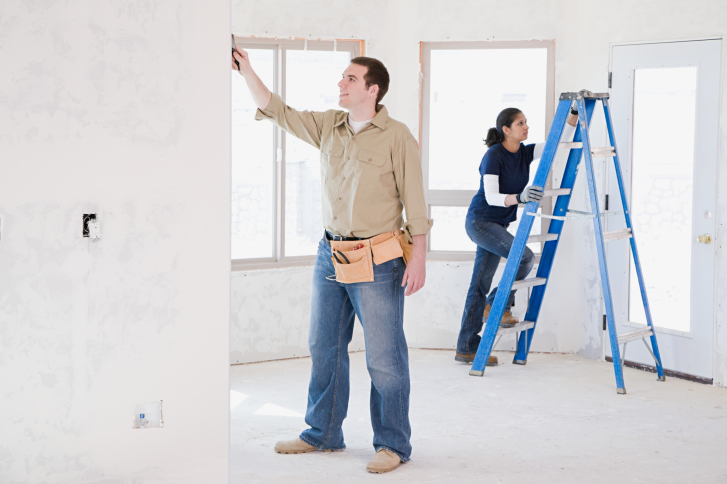
What Will It Cost?
If you’re going into a home expecting a few renovations costs, a minor detail here or there may not add up to much. However, if you’re not interested in spending the big bucks on making changes, you’ll want to estimate an approximate amount of how much the renovations you don’t want to live without will amount to. By including all the necessary labor and materials, you’ll be able to determine if the price-point of your offer will be worth it. Keep in mind that if there are any serious issues with the house, it may not be worth your while to consider the purchase at all.
Will Renovations Increase The Value?
In the event that you’re buying a home for its investment value, it’s going to be particularly important to consider if the renovations required will actually increase its market value. While adding another bedroom or upgrading a bathroom may not add significantly to a home’s overall price, certain more inexpensive improvements like painting, refinishing and new siding can actually add a lot to the look (and worth) of your home.
How Much Are You Willing To Take On?
It’s easy to think that you’re prepared to do the dirty work when faced with a fixer-upper, but getting down to brass tacks may not be so simple when the time comes. Before taking on a home that needs a lot of renovation, consider how much you’re willing to do so that you can determine if fixing it up will even be an economic boon after all the labor that may go into it. If you’re not a DIY kind of person, you may want to avoid a house that has a long list of repairs.
A fixer-upper can be tempting for those who want to invest or save on a home purchase, but you’ll want to carefully consider if it will be a good choice when it comes to selling time. If you’re currently perusing the market for a home, you may want to contact one of our real estate professionals for more information.
 If you’re worried about your bad credit, you’ll want to do everything in your power to improve your rating as quickly as possible – especially if you have a major purchase coming up. Improving your credit rating can give you access to better interest rates on mortgages or even help you to get that job you’re after.
If you’re worried about your bad credit, you’ll want to do everything in your power to improve your rating as quickly as possible – especially if you have a major purchase coming up. Improving your credit rating can give you access to better interest rates on mortgages or even help you to get that job you’re after. When you’re just moving into a neighborhood, it can be hard to know exactly what you’re getting into. Certainly, you can see the sights for yourself and read about your new community online, but there are still things that may not be readily available. If you’re looking for the cold, hard facts on the safety of your neighborhood, look no further than the following websites for the things you’ll want to know.
When you’re just moving into a neighborhood, it can be hard to know exactly what you’re getting into. Certainly, you can see the sights for yourself and read about your new community online, but there are still things that may not be readily available. If you’re looking for the cold, hard facts on the safety of your neighborhood, look no further than the following websites for the things you’ll want to know. Making a home purchase in a neighborhood that is sure to boom in the coming years can be a great real estate investment, but guessing on the next trendy locale may seem fraught with risk. If you’re trying to determine which area will be up and coming down the road, here are some telltale signs that buying may be a benefit to your bank account.
Making a home purchase in a neighborhood that is sure to boom in the coming years can be a great real estate investment, but guessing on the next trendy locale may seem fraught with risk. If you’re trying to determine which area will be up and coming down the road, here are some telltale signs that buying may be a benefit to your bank account. The idea of an idyllic beachfront home is appealing for many people, but there are a number of factors involved in this type of home purchase that should be considered before getting serious. Whether it’s a home to live in full time, or a vacation property with investment potential, there are a number of issues to take note of. So, if you’re on the fence regarding waterfront property, here are some things you should keep in mind if beach life might be right for you.
The idea of an idyllic beachfront home is appealing for many people, but there are a number of factors involved in this type of home purchase that should be considered before getting serious. Whether it’s a home to live in full time, or a vacation property with investment potential, there are a number of issues to take note of. So, if you’re on the fence regarding waterfront property, here are some things you should keep in mind if beach life might be right for you. With the excitement involved in moving into a new home and all of the things that need to be done, it can be easy to forget a few important things before you load up the moving van. If the day of departure is drawing closer and you’re mulling over the final details, here are some items you may want to check off the list first.
With the excitement involved in moving into a new home and all of the things that need to be done, it can be easy to forget a few important things before you load up the moving van. If the day of departure is drawing closer and you’re mulling over the final details, here are some items you may want to check off the list first. From mortgage to equity to debt-to-income ratio, there are many terms associated with home ownership that can be quite confusing if you’ve never been on the market for a home before. ‘Conforming loan limit’ may be a less familiar real estate term than the rest, but here are some things you’ll need to know about it and what it could mean for your biggest investment.
From mortgage to equity to debt-to-income ratio, there are many terms associated with home ownership that can be quite confusing if you’ve never been on the market for a home before. ‘Conforming loan limit’ may be a less familiar real estate term than the rest, but here are some things you’ll need to know about it and what it could mean for your biggest investment. With the cost of rent going up across the board and becoming even less affordable in metropolitan centers, it’s never been a better time to seriously consider home ownership. While the price of a home and all the associated costs can certainly seem like a tight squeeze after years of renting, here are some reasons you may want to consider giving up your rental and springing for a home instead.
With the cost of rent going up across the board and becoming even less affordable in metropolitan centers, it’s never been a better time to seriously consider home ownership. While the price of a home and all the associated costs can certainly seem like a tight squeeze after years of renting, here are some reasons you may want to consider giving up your rental and springing for a home instead. The cooler months of winter often seem like the best time to hibernate into your house and wait for spring to appear, but it can actually be a prime opportunity to start looking for a new home. If you’re not interested in waiting until next season, here are a few reasons you may want to get started on your home search a little earlier than expected.
The cooler months of winter often seem like the best time to hibernate into your house and wait for spring to appear, but it can actually be a prime opportunity to start looking for a new home. If you’re not interested in waiting until next season, here are a few reasons you may want to get started on your home search a little earlier than expected. When it comes to diving into home ownership for the first time, it can seem like there are so many things you just don’t know. Whether you’re getting advice from your real estate agent, your friends or your family, there are so many things that seem like common sense that they might be lost in the mix of details. Instead of having to squeeze it out of them, here are three tips that are easily forgotten but still essential.
When it comes to diving into home ownership for the first time, it can seem like there are so many things you just don’t know. Whether you’re getting advice from your real estate agent, your friends or your family, there are so many things that seem like common sense that they might be lost in the mix of details. Instead of having to squeeze it out of them, here are three tips that are easily forgotten but still essential.